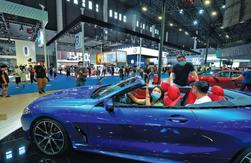 Visitors try out a racing car during the event. (WANG XIAO / CHINA DAILY)
Visitors try out a racing car during the event. (WANG XIAO / CHINA DAILY)
Chengdu, capital of Sichuan province, is most well-known for spicy hotpot and pandas. But for people in the automobile industry, the city's appeal doesn't stop there, especially this year.
Due to the pandemic, the annual Geneva motor show in Switzerland was canceled and the biennial Beijing auto exhibition has been delayed.
The annual event attracts over 120 Chinese and international brands ranging from Wuling and Geely to Mercedes-Benz and Rolls-Royce, according to the event's organizing committee
So the Chengdu auto show, which kicked off on Friday and continues to Aug 2, is the first major offline gathering for carmakers, dealers, reporters and visitors this year.
The annual event attracts over 120 Chinese and international brands ranging from Wuling and Geely to Mercedes-Benz and Rolls-Royce, according to the event's organizing committee.
A total of 16 models made global debuts and 26 had their China premieres on the first day of the motor show.
READ MORE: Highlights from the 2019 Shenzhen-HK-Macao Auto Show
Around 2,700 reporters are covering the event, and the number of visitors to the week-long exhibition could reach 700,000, the committee said.
Analysts said as the pandemic is basically curbed in China, the auto industry, which is currently using a lot of livestreaming to sell cars, needs a major offline event to remind people of what things were like in pre-pandemic days.
"Luxury is sometimes beyond words. You have to sit in the car to feel it," said one senior executive at a premium carmaker.
And what Chengdu offers is more than a chance to go through the motions. The city itself has vast market potential, which is probably an even more attractive thing.
Chengdu has more than 5 million vehicles on its roads, second only to Beijing in the country, according to the China Passenger Car Association, and it is thus the most important market in western China.
In the first first half of the year, China's auto industry suffered something it has not seen in decades.
Statistics from the China Association of Automobile Manufacturers show that passenger car sales totaled 7.87 million, slumping over 22 percent year-on-year.
To prevent such a scenario for the whole year, carmakers have to do a better job in the second half of the year and recoup at least part of the lost ground.
The Chengdu motor show is "the place to sound the charge", according to its organizing committee.
Chinese carmakers are launching branding campaigns to convince customers of their advances compared with international volume brands.
ALSO READ: Beijing Auto show highlights e-cars designed for China
Volvo owner Geely is presenting its compact modular architecture, a 12-billion-yuan (US$1.71 billion) platform it has developed with Volvo.
The Chinese carmaker is building models under four brands including Lynk & Co. The brands have collectively deliveried 600,000 vehicles.
China's largest SUV producer Great Wall Motors made the global debut of a Wey-branded SUV based on its brand-new platform built for off-road vehicles.
The platform, called Tank, is one of two unveiled a couple of days ago, with the other designed for sedans, SUVs and MPVs.
Wuling is coining a concept called "mini age for people's mobility" to introduce its mini-electric cars, and is showcasing its first model with a new logo for the global market.
Some international volume brands are not showing new models but are using the opportunity to build closer relations with customers.
Chinese and German executives from SAIC Volkswagen greeted the three millionth Skoda owner and Dongfeng Nissan is inviting potential buyers to join its 12 million customers.
Electric car startups are reinforcing their positions. Nio launched a coupe SUV which its founder William Li said it is to take on Tesla's Model Y. The model, called the EC6, will start deliveries in September.
WM Motor is showcasing two models at the event. It announced on Friday it is to build a global research and development center in Chengdu.
When completed, the 5.5-billion-yuan center will become the first facility dedicated to developing new energy passenger vehicles and relevant technologies in Sichuan province.
The center will coordinate the carmaker's global research and development efforts, with a special focus on the application of cutting-edge technologies including 5G and artificial intelligence in vehicles.
Premium and luxury vehicles outperformed the overall market in the first half of 2020, but they are not sparing their efforts either.
After all, Chengdu has more luxury cars than any other Chinese city with the exception of Shenzhen in Guangdong province. In terms of premium cars, it ranks third after Beijing and Shanghai, according to the China Passenger Car Association.
Mercedes-Benz launched three new models in Chengdu, which are part of 18 models in the German carmaker's product plan for China this year.
The company sold a record number of vehicles in the second quarter, but Jan Madeja, president and CEO of Beijing Mercedes-Benz Sales Service Co, said it was partly because of the pent-up demand in the first quarter, so the company will not take things for granted in the second half.
BMW, which also saw a sales surge in the second quarter, unveiled the 4 Series coupe and the new MINI Countryman at the Chengdu auto show.
The all-new Porsche Taycan made its China premiere on Friday, and Maserati is showcasing the limited edition Ghibli Fenice, together with Levante and Quattroporte special editions.


